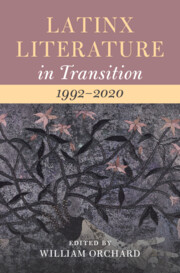Book contents
- Latinx Literature in Transition, 1992–2020
- Latinx Literature In Transition
- Latinx Literature in Transition, 1992–2020
- Copyright page
- Contents
- Contributors
- Acknowledgments
- Introduction
- Part I Shifting Coordinates
- Part II Transforming Genres
- Part III Emerging Media
- Part IV Theoretical Turns
- Bibliography
- Index
- References
Part I - Shifting Coordinates
Published online by Cambridge University Press: 19 June 2025
- Latinx Literature in Transition, 1992–2020
- Latinx Literature In Transition
- Latinx Literature in Transition, 1992–2020
- Copyright page
- Contents
- Contributors
- Acknowledgments
- Introduction
- Part I Shifting Coordinates
- Part II Transforming Genres
- Part III Emerging Media
- Part IV Theoretical Turns
- Bibliography
- Index
- References
Information
- Type
- Chapter
- Information
- Latinx Literature in Transition, 1992–2020 , pp. 23 - 132Publisher: Cambridge University PressPrint publication year: 2025
